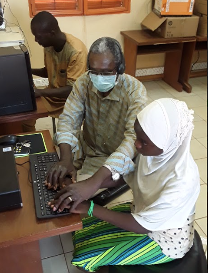This blog was originally posted on World Education Blog Posted on 12 March 2021 by GEM Report
Christophe Oulé became blind when he was 43. “It did not happen immediately,” he said. “It took six months. At first, I felt useless. When I first knew, I told myself, a person who is blind has no access to work, to school, no access to life… I wasn’t at all happy to be like this and to be dependent on my family. I wasn’t contributing to the family. It was so difficult for me.
The biggest challenge when you’re a person with a visual disability is access to information and understanding what’s happening around you. My major difficulty was not being able to read books. You see, when you’re unemployed, not being able to divert yourself by reading is a great burden.
I really wanted to read. My wife had an uncle who is Director of UN-ABPAM (the National Union of Burkinabé Associations for the Promotion of the Blind and the Visually Impaired). So, we went there to see what they could do.
They helped me learn to read in Braille. I received training to become a trainer in computer science adapted to visual impairment in France.”

Monsieur Oulé not only became a trainer teaching pupils, students and workers in assistive technology, he also became a strong advocate for inclusive education and served as General-Secretary of UN-ABPAM. Today, he holds the role of President of the organisation.
At age 60, he continues working as a trainer for blind learners, drawing from his conviction that barriers to learning have to be removed.
“After learning about computers and accessible programmes, I volunteered to help children with visual disabilities at school.
As soon as you write a text on computers using assistive technology it is fabulous. My head was full of dreams, of ideas of what I could do with this. I was able to leave my isolation and support others to do the same,” he says.
During the COVID-19 pandemic schools had to shut down. The government decided to put courses online, on television and radio.
“For the students in the school where I work, this wasn’t enough. At UN-ABPAM, together with our international partner Light for the World, we discussed with our Ministry of Education to take children with disabilities into account, but it was not possible. So, we prepared our own accessible courses and study materials for students with visual impairments so that they could continue their annual exams.
Technology allowed us to remove some barriers for the kids with visual disabilities. We were able to facilitate their learning with excellent results. We had 6 candidates taking the exam and 5 passed their Baccalaureate!”
Learning heroes like Mr Oulé lead the way in making sure that learners with disabilities are not excluded from inclusive, high-quality and equitable education. Even in the most difficult of circumstances. Governments need to support them.
